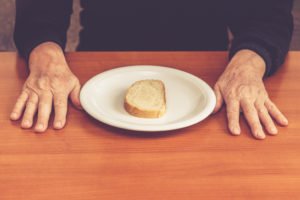
The effects of malnourishment include a loss of mobility, an increased risk of falling, a weakened immune system, delays in healing, organ damage, and cognitive decline. People who live in nursing homes are often in poor health. Malnourishment can worsen their conditions and may lead to life-threatening complications.
How Malnutrition Can Affect Overall Health
Malnourishment can lead to a decrease in white blood cell count. That can make it harder for the immune system to fight off illnesses and infections and for wounds to heal. This is a particularly serious danger for individuals in nursing homes since patients often already have weakened immune systems.
In addition, long-term care facilities are filled with residents who may have a variety of illnesses. Staff members move from room to room to care for patients, and family members and friends come to visit. That can make it easy for illnesses to spread.
Not getting enough vital nutrients can affect numerous organs. A decline in kidney function can cause dehydration and can affect the joints and heart. Malnutrition can also impact the brain and can lead to changes in coordination, speech, and memory.
Good nutrition can keep bones and muscles strong. A person who does not get essential nutrients in sufficient amounts may experience muscle and bone deterioration. That can lead to poor posture, weakness, and falls. An elderly person who falls may break a hip or another bone and may also suffer head trauma and bruises.
For a free legal consultation, call 800-712-9119
Signs of Malnourishment
A person who is malnourished may not get enough calories, protein, and nutrients and may lose weight, including both fat and muscle. Malnutrition can cause a marked change in appearance, including hollow cheeks, sunken eyes, a swollen stomach, and dry skin and hair. A person who is malnourished may be fatigued, irritable, depressed, or anxious and may have difficulty concentrating.
An overweight person may be malnourished if they eat foods that are high in calories and fat, but low in essential nutrients. Not getting enough vital nutrients can increase the risk of death.
How Nursing Home Residents Can Become Malnourished
Staff at long-term care facilities have a responsibility to provide appropriate care and to work to improve or maintain the condition of their patients. That includes providing nutritious meals, serving adequate portions, making accommodations for residents who have special dietary needs or restrictions, and assisting individuals who are unable to feed themselves.
Sometimes nursing homes fail to meet one or more of those obligations, and residents suffer as a result. Long-term care facilities may fall short for several reasons.
Understaffing is a serious problem at nursing homes across the United States, according to The National Consumer Voice for Quality Long-Term Care. The physical and mental demands of the job often cause employees to become stressed and burnt out. These factors frequently lead to high turnover rates and understaffing.
If employees are feeling overwhelmed and struggling to keep up, they may not take the time to help senior citizens who are unable to feed themselves. Workers may not provide food that meets an individual patient’s dietary guidelines or may not make modifications, such as cutting food into small pieces or pureeing it, that would allow a resident to consume it safely. Failing to meet patients’ nutritional needs is a form of neglect.
In some cases, nursing home staff withhold food to punish residents for their words or actions, to intimidate them, or to retaliate against them for complaining about an employee’s actions or conditions at the facility. Sometimes workers serve food but fail to provide assistance, knowing that a patient is unable to eat without help. This is a form of abuse.
Click to contact our personal injury lawyers today
How a Nursing Home Abuse and Neglect Lawyer May Be Able to Help Your Family
If you visited your loved one in a nursing home and noticed the effects of malnourishment, such as weight loss, a change in facial features, or a difference in your relative’s personality or demeanor, he or she may be suffering from neglect. That can have serious and life-threatening consequences. Not getting proper nutrition may have already caused your family member’s condition to deteriorate.
A personal injury attorney may be able to file a lawsuit against the nursing home to seek compensation for medical treatment that was required because of malnourishment, as well as for your loved one’s pain and suffering. Ben Crump Law, PLLC, has represented clients across the United States who suffered abuse and neglect in nursing homes. Our firm operates on contingency. That means that we only get paid if we obtain a financial award on behalf of a client.
Each state has a statute of limitations that requires victims of personal injuries to file a lawsuit within a specific period of time. A member of our team can discuss your state’s statute of limitations and how we may be able to help you. Call Ben Crump Law, PLLC, today at 800-959-1444.
Call or text 800-712-9119 or complete a Free Case Evaluation form








